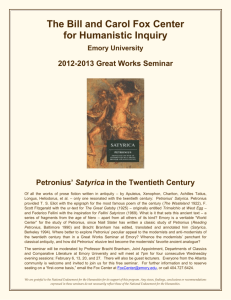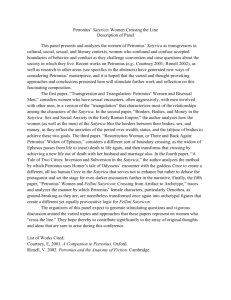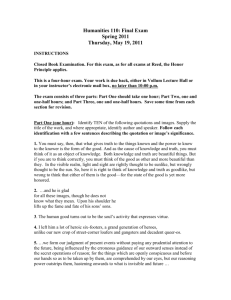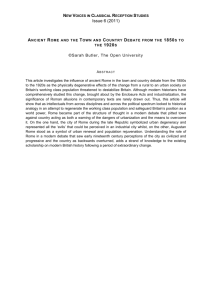CIRTA, NUMIDIA, 108 BC
advertisement
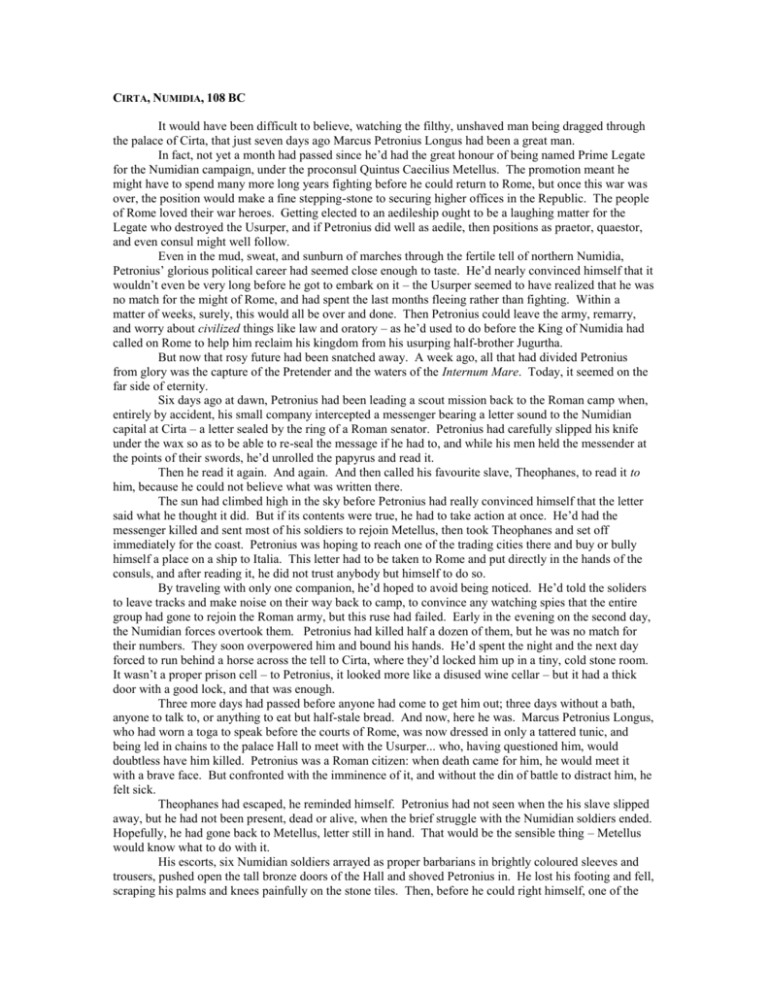
CIRTA, NUMIDIA, 108 BC It would have been difficult to believe, watching the filthy, unshaved man being dragged through the palace of Cirta, that just seven days ago Marcus Petronius Longus had been a great man. In fact, not yet a month had passed since he’d had the great honour of being named Prime Legate for the Numidian campaign, under the proconsul Quintus Caecilius Metellus. The promotion meant he might have to spend many more long years fighting before he could return to Rome, but once this war was over, the position would make a fine stepping-stone to securing higher offices in the Republic. The people of Rome loved their war heroes. Getting elected to an aedileship ought to be a laughing matter for the Legate who destroyed the Usurper, and if Petronius did well as aedile, then positions as praetor, quaestor, and even consul might well follow. Even in the mud, sweat, and sunburn of marches through the fertile tell of northern Numidia, Petronius’ glorious political career had seemed close enough to taste. He’d nearly convinced himself that it wouldn’t even be very long before he got to embark on it – the Usurper seemed to have realized that he was no match for the might of Rome, and had spent the last months fleeing rather than fighting. Within a matter of weeks, surely, this would all be over and done. Then Petronius could leave the army, remarry, and worry about civilized things like law and oratory – as he’d used to do before the King of Numidia had called on Rome to help him reclaim his kingdom from his usurping half-brother Jugurtha. But now that rosy future had been snatched away. A week ago, all that had divided Petronius from glory was the capture of the Pretender and the waters of the Internum Mare. Today, it seemed on the far side of eternity. Six days ago at dawn, Petronius had been leading a scout mission back to the Roman camp when, entirely by accident, his small company intercepted a messenger bearing a letter sound to the Numidian capital at Cirta – a letter sealed by the ring of a Roman senator. Petronius had carefully slipped his knife under the wax so as to be able to re-seal the message if he had to, and while his men held the messender at the points of their swords, he’d unrolled the papyrus and read it. Then he read it again. And again. And then called his favourite slave, Theophanes, to read it to him, because he could not believe what was written there. The sun had climbed high in the sky before Petronius had really convinced himself that the letter said what he thought it did. But if its contents were true, he had to take action at once. He’d had the messenger killed and sent most of his soldiers to rejoin Metellus, then took Theophanes and set off immediately for the coast. Petronius was hoping to reach one of the trading cities there and buy or bully himself a place on a ship to Italia. This letter had to be taken to Rome and put directly in the hands of the consuls, and after reading it, he did not trust anybody but himself to do so. By traveling with only one companion, he’d hoped to avoid being noticed. He’d told the soliders to leave tracks and make noise on their way back to camp, to convince any watching spies that the entire group had gone to rejoin the Roman army, but this ruse had failed. Early in the evening on the second day, the Numidian forces overtook them. Petronius had killed half a dozen of them, but he was no match for their numbers. They soon overpowered him and bound his hands. He’d spent the night and the next day forced to run behind a horse across the tell to Cirta, where they’d locked him up in a tiny, cold stone room. It wasn’t a proper prison cell – to Petronius, it looked more like a disused wine cellar – but it had a thick door with a good lock, and that was enough. Three more days had passed before anyone had come to get him out; three days without a bath, anyone to talk to, or anything to eat but half-stale bread. And now, here he was. Marcus Petronius Longus, who had worn a toga to speak before the courts of Rome, was now dressed in only a tattered tunic, and being led in chains to the palace Hall to meet with the Usurper... who, having questioned him, would doubtless have him killed. Petronius was a Roman citizen: when death came for him, he would meet it with a brave face. But confronted with the imminence of it, and without the din of battle to distract him, he felt sick. Theophanes had escaped, he reminded himself. Petronius had not seen when the his slave slipped away, but he had not been present, dead or alive, when the brief struggle with the Numidian soldiers ended. Hopefully, he had gone back to Metellus, letter still in hand. That would be the sensible thing – Metellus would know what to do with it. His escorts, six Numidian soldiers arrayed as proper barbarians in brightly coloured sleeves and trousers, pushed open the tall bronze doors of the Hall and shoved Petronius in. He lost his footing and fell, scraping his palms and knees painfully on the stone tiles. Then, before he could right himself, one of the men grabbed him by the hair and forced his head up while the others arranged themselves on both sides of him, their long spears and tall shields held at attention. “Your Majesty!” the leader called out in Greek. “The citizen!” Petronius’ eyes went to the end of the room. There, King Jugurtha – for so the man called himself – was reclining on a richly gilded couch, surrounded by slaves and squealing concubines dressed in linen so fine Petronius could see right through it. The Usurper himself was in bronze and leather armour, as if to go straight into battle, but he was wearing a diadem instead of a helmet, and the mantle draped over his shoulders and lap appeared to be woven of gold. The sword at his belt was light and encrusted with jewels, an ornament rather than a weapon. He was older than Petronius might have expected. Descriptions of his vigor and ferocity had suggested someone not much older than Petronius himself; perhaps thirty or thirty-five. But Jugurtha was almost fifty. His curly hair was still thick and dark, but there was silver at the temples. His chin and nose were sharp, and heavy black brows made his eyes look sunken. Petronius thought he looked like an eagle – a creature that carried itself with magnificence and dignity, but nevertheless ate carrion off the battlefield. This man drained the golden cup he was holding and laughed as he handed it to one of the slaves. “Be careful!” he said to the soldiers. “These Romans” – he used the feminine Romanae rather than the masculine Romani – “are fragile, you know! Treat them too roughly, and they might break!” The concubines giggled. One of them pushed a slice of pomegranate at their master’s mouth, but he slapped her hand aside as a man might swat a fly and stood up, letting the gold mantle slide off as he approached his prisoner. It was no wonder this man had won such fame in the Iberian wars, Petronius thought; Jugurtha was not tall, but he was as broad and thick as a bull, muscles and sinews sliding under his skin as he moved. The Greeks, who idolized the male body, would have worshipped him. He came up and stood over Petronius, glaring down at him with piercing black eyes. Petronius knew what he was supposed to do now – the Usurper wanted him to drop his gaze in submission, but Petronius was not about to give him the pleasure. Instead, he forced himself to breathe evenly and met the Usurper’s eyes without blinking. A Roman did not die a coward. Jugurtha finally stepped back, sneering, then turned and pointed at his concubines. “You,” he told them. “Out.” Without a word, they gathered up their fruit and their pipes and scurried out, like roaches at the lighting of a lamp. “The doors,” said the Usurper. “Close them.” Eight slaves stepped up to obey. The heavy doors groaned as they moved and shut with a reverberant metallic thump, terrible in its finality. Petronius suddenly understood, in a way that hadn’t really seemed to penetrate him until that moment, that he was never going to leave this room. He would die here where he knelt, and this hawk of a man, whose terrible ambition now encompassed not only his half-brother’s kingdom but even Rome itself, would have nobody to stop him. Petronius prayed to whatever gods might be listening that Theophanes had reached Metellus safely. “Cenobia,” Jugurtha said. “Come here.” A woman stepped out from behind a hanging banner. She was swarthy and dark-eyed, but her hair, perhaps by nature or perhaps by application of some cosmetic, was the colour of ripe wheat. She was dressed as a Greek, in a bright blue chiton with gold brooches, and hung with gold and lapis as if she was a queen. And maybe she was – she did not answer the Usurper or bow to him. She simply came forward and stood there, watching. The Usurper looked at Petronius again. “Cenobia is a sorceress,” he said. “She can see men’s minds, and she will know if you tell a lie.” “The citizens of Rome are not liars,” said Petronius. He tried to study the woman out of the corner of his eye, without openly staring. She certainly looked the part of a magician, but she could just as easily be there for show, to scare him into honesty. It probably didn’t matter. Whether Petronius lied or not, the Usurper knew that the Romans had intercepted his letter, and this interview would end with Petronius dead. Jugurtha gave a snort. “What is your name?” he asked. “Marcus Petronius Longus, son of Publius, grandson of Publius, great-grandson of Gnaeus.” “I asked for your name, not your grandfather’s,” said the Usurper. “What about your friend? The fair-haired boy who was with you – who was he? A lover of yours, maybe?” He grinned. “I know what the Romans do with pretty little boys.” “Theophanes,” Petronius answered the question and ignored the rest. Jugurtha was trying to anger him, but he was not going to rise to it. Romans were men of courage and self-control. “He is my slave, a scribe and a book-keeper.” “And where is he now?” Jugurtha wanted to know. Petronius breathed in sharply – if the Usurper had to ask, then Theophanes was still alive and free! “I don’t know,” he said. “He fled.” “I see.” The Usurper nodded curtly. “He’s dead, then. My generals already met the men you sent back to your Metellus, and had all of them killed. Against my orders, by the way, but the dead are the dead.” Petronius lowered his head. He’d been very fond of Theophanes; the boy was barely sixteen with a face pretty enough to be a girl’s, but he was bright and scholarly, good at mathematics and composition. He’d even dabbled in magic as a hobby, though he was much better with the theory than the practice. Death in an ambush did not suit him. “Was that letter the first you’d heard of my plans?” asked Jugurtha. “Yes,” said Petronius. “Although I think some have begun to guess.” “Have they really?” The Usurper climbed the steps to his couch and sat down again. “Tell me everything you know,” he ordered. “Everything you read in the letter, everything you guessed from it, and everything you think the others suspect. Let us not tarnish the Roman reputation for honesty,” he added dryly. And Petronius did not. If Theophanes were dead, it didn’t matter either way; he might as well tell the truth. He’d memorized the contents of the letter, and now he repeated them back word by word: a confirmation that eighteen senators, listed by name, were willing to support a plot to assassinate Gaius Marius, the man Petronius had replaced as Metellus’ Prime Legate... and that evidence against them had been collected as ordered, so they would have to take the blame for their actions once the deed was done. Petronius knew most of the men named in the letter, even if only in passing. They were men of good lineage, and their dislike of Marius was well known. Gaius Marius was not from a patrician family – his father owned a small latifundium near Arpinum, and there were many in Rome who thought that this farmer’s son ought to return to the countryside and not meddle in the affairs of his betters. His sudden and somewhat mysterious decision to leave the campaign and return to Rome to run for consul must’ve offended them deeply. Jugurtha had probably offered them bribes to turn their dislike into action. “I assume,” he said, “that you want to divide the senate. While they’re fighting amongst themselves, you will invade Italia.” “That is a very Roman assumption,” the Usurper said. “All the world lies in the shadow of Rome! I am Jugurtha, not Hannibal. I am not interested in Rome or its empire. I want only what is mine, but,” he added darkly, “if I must break Rome to get it, then break her I shall.” He lowered his head, studying Petronius’ face. “Did it not occur to you, citizen, that this might be a personal matter? A score your Marius and I need to settle?” He seemed to expect his prison to know what he was hinting at, but Petronius had no idea. “No,” he said. “I hadn’t thought of that.” Jugurtha’s dark eyes narrowed. “So you don’t know, then, why I haven’t already killed you.” “No.” Petronius suppressed a shudder. There was something in the Usurper’s voice that made him suddenly think this man could do much worse than simply kill him. “I had assumed you wanted to question me first.” “Do you think your Marius can destroy me?” Jugurtha asked. Petronius didn’t answer. He had never liked Marius very much as a man – Gaius Marius was brave and cunning in battle, but he was also as stubborn as an ox, and a terrible braggart. The word from Rome, however, was that the people seemed to feel he deserved a chance. Men of distinguished families had failed to settle things in Numidia. Maybe a farmer’s son could succeed. “He seems terribly sure of himself,” the Usurper persisted. “Don’t you wonder why?” “I had heard that he visited an oracle, who told him that the god Mars had a great destiny in mind for him,” said Petronius. “He believes that the gods will use him to end this war.” Jugurtha laughed out loud. “Oh, yes, indeed! But it’s your Marius who uses the gods, not they him! You know, I suppose, that I met with the man only weeks before he returned to your city? He said we were going to talk of peace!” Petronius did know that. The conference seemed to have failed – the war went on, and Marius returned to Rome at once for the elections. Nobody but Marius and Jugurtha themselves knew what had actually been said, but it seemed to have frightened the Usurper. His armies were hiding in the woods and the mountains, and the Romans hadn’t been able to bring him to battle in weeks. “Do you know how your great Marius means to beat me?” asked Jugurtha. “When I stood up to greet him, as one civilized man does another – even another who lives in a city governed by the whims of the rabble! – he put a hand on my shoulder and called on Mars to lay me under a curse! If I kill or order the death of a Roman citizen, he told me, even in battle, the god will see to it that Numidia falls to Rome. That is how he hopes to defeat me. So now I am forced to flee like a dog instead of fighting, and only the death of Marius himself can free me. What do you think of that?” “I could not say,” said Petronius. His first reaction was that such a thing could not possibly be true. The use of a curse was, by honourable standards of warfare, cheating – it was men who ought to bow to the will of the gods, not the other way around. But even if Marius had stooped to magic in his bid for glory, surely the Usurper did not think that the dishonourable actions of a single man would be enough to make Petronius betray Rome. His breathing suddenly quickened. There was an easy way to test – Petronius himself was a citizen of Rome! Under the terms of the curse, the Usurper could not kill him. If what Jugurtha had just said were true, Petronius might yet leave this room alive. “No?” Jugurtha snorted. “Well, then, perhaps you can answer this: What am I going to do with you? Your Metellus will be upon this city in days. I have to leave now, or risk bringing the curse down on my head. But I cannot kill you, and I can’t leave you behind to be rescued. What, then, do you suggest?” “I suppose you must take me with you,” said Petronius, carefully emotionless. He tightened his fists again, his nails digging into his palms. But Jugurtha dismissed the idea with a wave of his hand. “Take you with me? And drag your weight into the desert, having to feed and water you on the way? Keeping you chained and wasting men to watch you so that you can’t escape? That is not a solution – that is a waste of my resources. No, if you’re going to accompany me...” he paused and smiled a bit. “You will have to earn your keep.” He turned to the sorceress. Petronius had almost forgotten that the woman was there, but she had been standing by the couch, silently watching the entire conversation. “Cenobia,” said the Usurper. “Perhaps you could transform him into something more useful. A horse, maybe.” He smiled, pleased with this idea. “Let him feel my whip as he pulls my chariot!” Petronius stiffened. There were sorcerers capable of such magic, but in Rome the use of it was forbidden by law. Even the barbarian Gauls who lived beyond the Rhine considered it an abomination to change men into beasts. The sorceress, however, shook her golden head. “I’d rather not, your Majesty,” she said. “A man transformed retains his mind and memory. We would only make him stronger and swifter, giving him an excellent chance to kill you or escape, and there are sorcerers among the Romans who could recognize and restore him. Some of the Greeks they keep as slaves are as good with magic as I.” Jugurtha, disappointed, scowled. “What would you do instead, then?” “Send him away,” she replied promptly. “Oh, yes? To where?” “To a place from which he can neither return nor send any sort of message,” said Cenobia. “Only magic will be able to reach him, but no-one will ever know where he is to try to retrieve him.” “And where is such a place?” asked Jugurtha. The sorceress smiled. “Where,” she said, “is the wrong question.” This plainly meant something more to the Usurper than to Petronius – his face brightened, and he smiled again. “What do you require?” he asked. “Two slaves and a courtyard in the sunlight,” said Cenobia. “Give me those, and in half an hour he will be no more danger to you. Ever.” “Very well.” Jugurtha nodded. “Make it so, at once.” He glared at Petronius. “Get him out of my sight. And next time you bring me a prisoner to question, bathe the bastard first and save us all his stench!” The bronze doors groaned open again, and the guards dragged Petronius to his feet and marched him out of the hall. Cenobia and her slaves followed them outside into a broad courtyard. In cooler years, it must have been a pleasant place – it was full of waterways, surrounded by flowers and ornamental trees – but the drought had left the fountains dry and the leaves limp on their stems. There, the guards chained Petronius between two stone pillars with the sun beating down hot on his back, while the sorceress gave orders to her slaves in the Punic tongue of the Numidians. “Where are you sending me?” asked Petronius. A naked slave girl trotted up and handed the sorceress something wrapped in a piece of red cloth. She unfolded this and took out a long transparent crystal, which flashed as she held it up to the sun. “Sorceress,” he persisted. “Where are you sending me?” He didn’t know what kind of exile might match the description she’d given the Usurper, but he had a good idea that he was about to learn what people meant when they spoke of fates worse than death. “As I told his Majesty in the hall,” she replied, “where is the wrong question.” “Then what is the right question?” asked Petronius. Was she about to send him bodily to the underworld? She lowered her crystal and reached to run a finger down Petronius’ unshaved cheek. “The Romans are like their statues,” she said in Greek. “Handsome and unmoving. Do men ever smile in Rome?” “Answer me,” he said. “I am not sending you anywhere,” Cenobia told him. “You will remain right on this spot.” “So what are you going to do with me?” Petronius asked. She was clearly enjoying her riddles, but he had no patience for them. If she were going to condemn him to some horrible fate, she could at least warn him of what it was. She held up her crystal again, studying it as if looking for imperfections. “You are a leader of men, so I assume you must have been educated. What becomes of empires? What happened to Egypt and Persia, and all the lands conquered by Alexander?” She looked expectantly at Petronius. “They have fallen,” he said through his teeth. “Divided up into petty kingdoms of barbarians. Jugurtha means to do the same to Rome.” It could not possibly succeed, he thought. The guilty senators would reveal him, even if only to save their own necks, and Rome would destroy him curse or no curse. “Jugurtha does not care what happens to the Tyrant of Cities,” said the sorceress, “so long as she ceases to interfere in other peoples’ wars. But all empires are doomed to fall, and Rome is no different. Tempus edax rerum – time devours all! Now.” She laid the crystal back on the cloth. “Tell me, O learned man, what came before Egypt and Persia? What kind of empires were there two thousands of years ago?” “I do not know,” said Petronius. Any such empires had left no writings, only myths – tales of Troy and Minos, kingdoms and cities that might never have existed outside of the imaginations of poets. “No one knows.” The sorceress looked up at the sky – the sunlight gleamed on her golden hair and glittered on her jewelry. “No one remembers. And in two thousands of years more,” she added, “noone will remember Rome, either. The right question, Marcus Petronius Longus... is when.” -Left him his signet ring. His worry that he will never do something significant.
